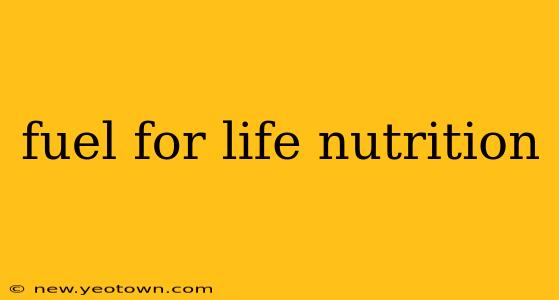We all know that food fuels our bodies, but understanding exactly how it does so, and choosing the right fuel, is a journey worth taking. This isn't just about losing weight or gaining muscle; it's about optimizing your health, energy levels, and overall well-being. Think of your body as a high-performance machine – the right fuel ensures it runs smoothly and efficiently, while the wrong fuel leads to breakdowns and sluggishness. Let's embark on this journey together, exploring the essential elements of fueling your life with optimal nutrition.
What are the essential nutrients for a healthy life?
This is a fundamental question, and the answer is multifaceted. Our bodies require a balanced intake of macronutrients (carbohydrates, proteins, and fats) and micronutrients (vitamins and minerals). Each plays a crucial role in various bodily functions. Carbohydrates provide immediate energy, proteins build and repair tissues, and fats support hormone production and cell function. Vitamins and minerals act as catalysts for countless metabolic processes. A deficiency in any of these can lead to a cascade of health problems. Think of it like a car needing gasoline, oil, and coolant to run properly – each is essential, and neglecting one affects the whole system.
How much protein, carbohydrates, and fat should I consume daily?
The ideal macronutrient ratio varies significantly depending on individual factors like age, activity level, and health goals. There's no one-size-fits-all answer. A registered dietitian or nutritionist can help you determine your personalized needs based on your individual circumstances. However, a general guideline might be a balanced approach emphasizing whole, unprocessed foods. Focus on lean protein sources like fish, chicken, beans, and lentils; complex carbohydrates such as whole grains, fruits, and vegetables; and healthy fats found in avocados, nuts, and olive oil. Avoid excessive processed foods, sugary drinks, and unhealthy fats.
What are the best sources of vitamins and minerals?
Nature provides a bountiful supply of vitamins and minerals. Fruits and vegetables are packed with micronutrients, each offering a unique blend of vitamins and minerals. Leafy greens are excellent sources of folate and vitamin K, citrus fruits are rich in vitamin C, and sweet potatoes provide ample beta-carotene (which the body converts to vitamin A). Whole grains contribute various B vitamins and minerals like magnesium and iron. Including a wide variety of colorful fruits and vegetables in your diet is a key strategy to ensure adequate intake of essential micronutrients.
What is the importance of hydration in a healthy diet?
Water is often overlooked, but it's arguably the most crucial nutrient. It participates in nearly every bodily function, from transporting nutrients to regulating temperature. Dehydration can lead to fatigue, headaches, and decreased cognitive function. Aim to drink plenty of water throughout the day, adjusting your intake based on your activity level and climate. You can also get hydration from fruits and vegetables with high water content, like watermelon and cucumbers.
How can I make sure I'm getting enough fiber in my diet?
Fiber is a type of carbohydrate that's indigestible by the human body. It plays a vital role in digestive health, promoting regularity and preventing constipation. It also contributes to feelings of fullness, aiding in weight management. Excellent sources include whole grains, legumes, fruits, and vegetables. Increasing your fiber intake gradually is important to avoid digestive discomfort.
What are some common nutritional deficiencies and how can I prevent them?
Nutritional deficiencies can arise from inadequate intake, poor absorption, or increased needs due to illness or pregnancy. Common deficiencies include iron deficiency anemia (leading to fatigue and weakness), vitamin D deficiency (linked to bone health issues), and vitamin B12 deficiency (affecting nerve function). A balanced diet rich in diverse whole foods is the best prevention. However, blood tests can help identify deficiencies, allowing for targeted supplementation under the guidance of a healthcare professional.
This journey to optimal nutrition is a personal one. It's about making informed choices, listening to your body, and seeking professional guidance when needed. By understanding the fuel your body needs, you empower yourself to live a healthier, more energetic, and fulfilling life. Remember to consult with a healthcare professional or registered dietitian for personalized dietary advice.

